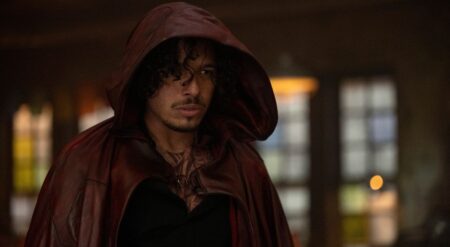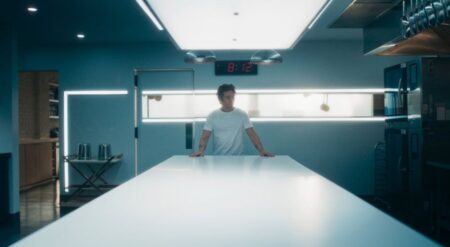Losing faith in a cherished series can be deeply disheartening. But in Star Trek, there’s a sense of trust that each story will find its footing. I’ve always found solace in the franchise, finding echoes of humanity’s struggles and triumphs in every crew’s journey. Throughout the past seven years, the crew of the USS Discovery has shone brightly, celebrated for its rich diversity and vibrant characters, all under the guidance of a daring writing team unafraid to challenge the status quo of Star Trek storytelling. However, in Star Trek: Discovery Season 5, something seemed to dim that spark.
The central storyline of Star Trek: Discovery Season 5 revolves around the crew of the USS Discovery, led by Captain Burnham (Sonequa Martin-Green), embarking on a mission to prove their worthiness of obtaining and utilizing Progenitor technology. This advanced technology, believed to have been created by the Progenitors, the presumed creators of all humanoid life, possesses capabilities unlike anything previously encountered. However, it has been hidden away for centuries by scientists who deemed society unready for its power.
With knowledge of a potential future where the Progenitor technology falls into the wrong hands, Burnham is determined to prevent such a catastrophe. To achieve this, the crew must undertake a series of tests devised by scientists from 800 years ago. This journey not only tests the Discovery crew’s abilities but also confronts them with profound ethical and moral dilemmas, echoing themes explored in previous Star Trek series.
From the outset of Star Trek: Discovery Season 5, it’s been evident that the series is paying homage to its predecessors in the Trek universe. As the crew embarks on their quest to prove themselves worthy of the Progenitor technology, they encounter tests and challenges reminiscent of those faced by previous generations. However, this journey quickly becomes predictable, following a familiar pattern of new tests, lessons learned, and moving on to the next challenge.

Further, these lessons often mirror those explored in previous seasons of Discover. Episodes draw heavily from various series that inspired the overarching narrative of Star Trek: Discovery Season 5. While the season aims to demonstrate Captain Burnham’s worthiness of obtaining Progenitor technology, it fails to delve deeper into the major themes and character arcs. It ultimately feels like a rehash of familiar territory rather than a bold exploration of new frontiers.
As Star Trek: Discovery Season 5 progressed, it quickly fell into a repetitive pattern. It’s disappointing, considering the crew’s capabilities and potential. While the crew engages in familiar missions and interactions that showcase their camaraderie and diversity, a sense of déjà vu permeates each episode. While this formula might appeal to those seeking familiarity, it’s a departure from the series’ reputation for innovation, particularly given its 32nd-century setting. It comes across as a missed opportunity to break new ground and delve into uncharted territory, opting instead to play it safe with a formulaic approach to storytelling.
While it would have been acceptable for the crew to embark on familiar missions if it meant substantial character development, unfortunately, this isn’t the case. Instead of further exploring the complexities of existing characters, much of the early season is dedicated to endearing Commander Rayner to both the audience and the crew of the Discovery. What initially appears as a power struggle for command between two captains evolves into a simplistic lesson in empathy for Commander Rayner.
All of this results in the crew spending an inordinate amount of time handholding Rayner into a leadership role, while Burnham continues to operate on the ground. Unfortunately, nothing throughout the season truly brings the Discovery crew together as the cohesive unit they once were. Characters like Adira (Blu del Barrio) are either sidelined entirely or stuck in repetitive romantic conflicts without meaningful resolution. However, the most egregious mishandling is reserved for Booker’s character.

Despite his pivotal role in season 4, Booker (David Ajala) is reduced to little more than a protector, needlessly trailing after Burnham. Adding insult to injury, some of his most significant screen time involves the actor portraying a computer program with Booker’s likeness, further undermining his character development. And he isn’t the only one facing such treatment. In an episode early in the season, where Dr. Culber is prominently featured, Wilson Cruz isn’t even playing the same character. The resulting identity crisis feels more like the plot writing him into circles than a genuine exploration of Dr. Culber’s experiences.
Culber’s storyline is just one of many examples where the series fails to follow through on its setups. From Saru’s (Doug Jones) relationship with President T’rina (Tara Rosling) to the parallel dynamics between Burnham/Booker and Moll/L’ak, to the ongoing implications of the 32nd century’s unpreparedness for Progenitor tech, the season introduces numerous intriguing plot points. But none of them are realized.
With too many plotlines introduced and insufficient time dedicated to each, the season appears more concerned with proving Burnham’s worthiness than with meaningful character development. Even Burnham, for all of her screentime, is just more of the same. As Burnham revisits lessons she’s already learned, it detracts from her overall character growth, suggesting that anyone with basic decency could have passed these tests.
The primary antagonist’s storyline, akin to a teenage love story-level plot, lacks any compelling draw. Viewers are asked to believe that Moll (Eve Harlow) serves as a mirror to what Burnham could have become in the 32nd century. She demonstrates a willingness to do anything for her loved ones. Had Discovery not reached the future while Burnham was alive, she could have easily found herself in Moll’s position, protecting Booker. Moreover, Booker has shown his willingness to risk the galaxy to prevent others from experiencing the loss he has endured.
There was potential for intriguing character dynamics between Burnham, Booker, and Moll. However, Moll’s motivation ultimately revolves around her love for a Breen, whom she encountered sporadically between courier runs. This weak motivation for a final villain falls short, particularly when the narrative fails to explore the depth of these dynamics beyond surface-level character dialogue.

Unfortunately, Star Trek: Discovery Season 5 feels inconsequential in the grand scheme of Star Trek canon, and that’s the most disheartening aspect. Despite much of the season paying tribute to older Trek, it paradoxically undermines some of the fundamental truths of the established canon. Sadly, the season’s attempt to deliver its most significant revelation falls flat, lacking the impact it should have had.
Star Trek isn’t just about its sci-fi lore; it’s about the values embodied by its cast and crew, reflecting who we should strive to be as a society. The storyline involving the Progenitors in this season hints at these themes. Sometimes, the message is straightforward. However, just as Discovery appears poised to challenge canon in meaningful ways, it disappointingly reverts to irrelevance.
One bright spot in the season is the unwavering dedication of the cast. Despite the shortcomings of the plot, the cast remains the heart and soul of Discovery. For those who have grown fond of the characters, the disappointment stems from the desire to see them explore the complexities of striving toward a utopian future and the pursuit of knowledge. Witnessing them navigate through recycled character arcs and navigate through a thin plotline is undeniably disheartening. Nonetheless, regardless of the challenges they faced, I’ll eagerly follow the cast wherever their journey takes them next.
In the end, Star Trek: Discovery Season 5 didn’t boldly go where it could have. As the season unfolded, I anticipated being moved to tears by the finale. However, reaching the end left me feeling only frustration. The final character montage serves as a painful reminder of the wasted potential that plagued the cast throughout the season. Instead of uniting them, the writing kept them more separated than ever before, hindering their exploration of new frontiers. Rather than venturing into the unknown, we were presented with more of the same. The emotional crescendo of Discovery’s journey concludes not with reverence, but with disappointment, as the realization sets in that we may never witness these beloved characters on screen again.
Star Trek: Discovery Season 5 is streaming on Paramount+.
Star Trek: Discovery Season 5
-
Rating - 4/104/10
TL;DR
Star Trek: Discovery Season 5 didn’t boldly go where it could have.







